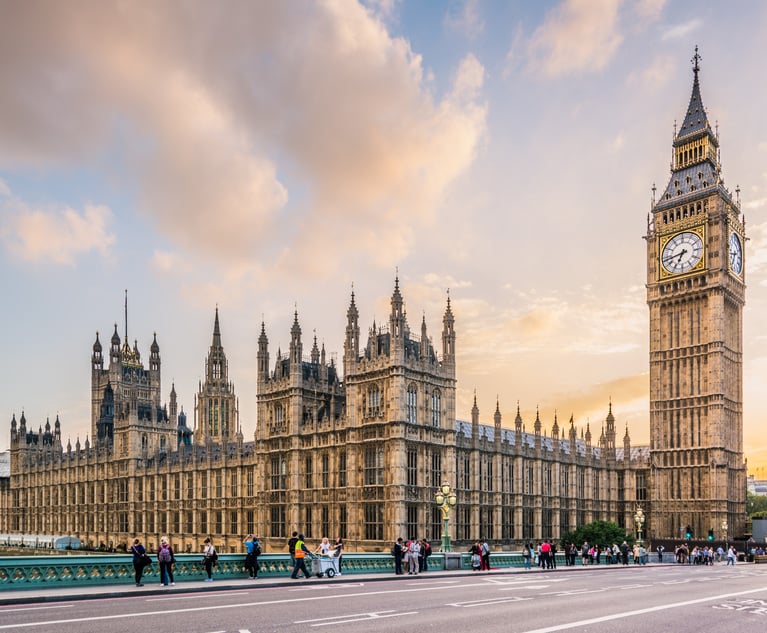Herbert Smith Freehills Wins First Arbitration Under Korea-US Free Trade Agreement
The case marked the first time an arbitral tribunal interpreted what is considered an investment under the seven-year-old trade agreement.
October 25, 2019 at 03:50 PM
3 minute read
 Seoul, South Korea. Photo: Shutterstock.com
Seoul, South Korea. Photo: Shutterstock.com
Herbert Smith Freehills has successfully defended the South Korean government on an arbitration claim under the Korea-U.S. free trade agreement (KORUS FTA) – the first arbitration award of its kind.
The claim was brought by Jin Hae-seo, a Korea-born U.S. citizen, who argued that the Korean government's expropriation in 2016 of a property she owned violated the seven-year-old KORUS FTA. The claim largely hinged on whether the property, which includes two houses, can be considered a U.S. investment in Korea under the KORUS FTA. The case marked the first time an arbitral tribunal interpreted what constituted an investment under the KORUS FTA.
A three-arbitrator tribunal sided with the Korean government and dismissed Jin's claims, stating that she was unable to show that she made an investment within the meaning of the KORUS FTA.
"By winning the claim at this early stage, the [Korean] Ministry of Justice will save considerable time and money," Mike McClure, Herbert Smiths Freehills' Seoul disputes head who led the firm's arbitration team on the claim, said in a statement. "Also, with so many close and historic ties between the two countries and their citizens, any other outcome could have led to a rush of similar claims under an agreement designed for international trade rather than individuals' investments."
The dispute centred on what constitutes an investment under the KORUS FTA. The tribunal emphasised three characteristics the FTA used to define a U.S. investment in Korea: commitment of capital or other resources; the expectation of gain or profit; or the assumption of risk. The tribunal noted that the claimant did commit capital (of $300,000 to purchase the property), but did not sufficiently show the other two characteristics.
The tribunal decided the claimant likely did not expect to gain or profit from the property because it believes she first purchased the property as a private dwelling for her family, which includes her husband and their children as well as her parents. The tribunal noted that the claimant did not rent out any part of the houses other than to her parents for the first two years after purchasing the property in 2001. And because the argument that the claimant expected to gain or profit from the property was weak, the assumption of risk was equally doubtful, the tribunal noted.
The tribunal consisted of Judge Bruno Simma of the Iran-U.S. Claims Tribunal in The Hague, who was the presiding arbitrator. The claimant appointed Hong Kong-based Des Voeux Chambers barrister Benny Lo as arbitrator, while the respondent appointed Donald McRae of the University of Ottawa's faculty of law. The hearing was held in Seoul from July 31 to August 2 and was administered by the Hong Kong International Arbitration Centre.
In addition to McClure, the Herbert Smiths Freehills team included Hong Kong partner Justin D'Agostino, the firm's executive partner of its global disputes practice. The firm worked with Korean firm Yoon & Yang, whose team included managing partner Junsang Lee, partners Sungbum Lee and Jeongju Jahng and senior foreign attorney Myung-ahn Kim.
The claimant was advised by Washington, D.C.-based arbitration lawyer Charles Verrill and Korea firm Dodam Law Firm foreign attorney Kim Ik-tae.
This content has been archived. It is available through our partners, LexisNexis® and Bloomberg Law.
To view this content, please continue to their sites.
Not a Lexis Subscriber?
Subscribe Now
Not a Bloomberg Law Subscriber?
Subscribe Now
NOT FOR REPRINT
© 2025 ALM Global, LLC, All Rights Reserved. Request academic re-use from www.copyright.com. All other uses, submit a request to [email protected]. For more information visit Asset & Logo Licensing.
You Might Like
View All
Malaysia’s Shearn Delamore Set To Expand Local Footprint With New Office Launch


CMA Uses New Competition Powers to Investigate Google Over Search Advertising

‘A Slave Drivers' Contract’: Evri Legal Director Grilled by MPs
Trending Stories
- 1Snapshot Judgement: The Case Against Illustrated Indictments
- 2Texas Supreme Court Grapples Over Fifth Circuit Question on State Usury Law
- 3Exploring the Opportunities and Risks for Generative AI and Corporate Databases: An Introduction
- 4Farella Elevates First Female Firmwide Managing Partners
- 5Family Court 2024 Roundup: Part I
Who Got The Work
J. Brugh Lower of Gibbons has entered an appearance for industrial equipment supplier Devco Corporation in a pending trademark infringement lawsuit. The suit, accusing the defendant of selling knock-off Graco products, was filed Dec. 18 in New Jersey District Court by Rivkin Radler on behalf of Graco Inc. and Graco Minnesota. The case, assigned to U.S. District Judge Zahid N. Quraishi, is 3:24-cv-11294, Graco Inc. et al v. Devco Corporation.
Who Got The Work
Rebecca Maller-Stein and Kent A. Yalowitz of Arnold & Porter Kaye Scholer have entered their appearances for Hanaco Venture Capital and its executives, Lior Prosor and David Frankel, in a pending securities lawsuit. The action, filed on Dec. 24 in New York Southern District Court by Zell, Aron & Co. on behalf of Goldeneye Advisors, accuses the defendants of negligently and fraudulently managing the plaintiff's $1 million investment. The case, assigned to U.S. District Judge Vernon S. Broderick, is 1:24-cv-09918, Goldeneye Advisors, LLC v. Hanaco Venture Capital, Ltd. et al.
Who Got The Work
Attorneys from A&O Shearman has stepped in as defense counsel for Toronto-Dominion Bank and other defendants in a pending securities class action. The suit, filed Dec. 11 in New York Southern District Court by Bleichmar Fonti & Auld, accuses the defendants of concealing the bank's 'pervasive' deficiencies in regards to its compliance with the Bank Secrecy Act and the quality of its anti-money laundering controls. The case, assigned to U.S. District Judge Arun Subramanian, is 1:24-cv-09445, Gonzalez v. The Toronto-Dominion Bank et al.
Who Got The Work
Crown Castle International, a Pennsylvania company providing shared communications infrastructure, has turned to Luke D. Wolf of Gordon Rees Scully Mansukhani to fend off a pending breach-of-contract lawsuit. The court action, filed Nov. 25 in Michigan Eastern District Court by Hooper Hathaway PC on behalf of The Town Residences LLC, accuses Crown Castle of failing to transfer approximately $30,000 in utility payments from T-Mobile in breach of a roof-top lease and assignment agreement. The case, assigned to U.S. District Judge Susan K. Declercq, is 2:24-cv-13131, The Town Residences LLC v. T-Mobile US, Inc. et al.
Who Got The Work
Wilfred P. Coronato and Daniel M. Schwartz of McCarter & English have stepped in as defense counsel to Electrolux Home Products Inc. in a pending product liability lawsuit. The court action, filed Nov. 26 in New York Eastern District Court by Poulos Lopiccolo PC and Nagel Rice LLP on behalf of David Stern, alleges that the defendant's refrigerators’ drawers and shelving repeatedly break and fall apart within months after purchase. The case, assigned to U.S. District Judge Joan M. Azrack, is 2:24-cv-08204, Stern v. Electrolux Home Products, Inc.
Featured Firms
Law Offices of Gary Martin Hays & Associates, P.C.
(470) 294-1674
Law Offices of Mark E. Salomone
(857) 444-6468
Smith & Hassler
(713) 739-1250








